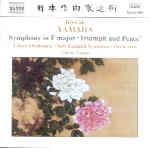Kôsçak Yamada’s Overture in D and Symphony in F are historically important: they’re the first works by a Japanese composer written for a Western symphonic ensemble. Unfortunately, they are musically trivial. Yamada was a student of Max Bruch, and both pieces sound resolutely mid-19th century in style while remaining melodically bland and clumsily scored for what sounds like a string orchestra with occasional touches of brass and wind coloration. The title of the symphony hardly prepares us for the placidly uneventful meandering that ensues. However, only a year later, in the two symphonic poems, Yamada had caught up with Strauss and the modern German school. Chromatic harmony and an enthusiastic use of harp, winds, brass, and percussion enliven his timbral palette, and if the idiom isn’t any more original or distinctive than previously, it’s certainly much more fun.
While I sympathize with the music’s historical relevance as justification for releasing these early works, I can’t help but wonder: Yamada, who was born in 1886, lived until 1965; I am very curious to hear some of the major works of his maturity, to see what elements he truly made his own. However sympathetically performed (and Takuo Yuasa gives each work loving treatment, securing fine playing from the two orchestras involved), I can’t imagine that this repertoire represents the composer at his best, or at any event, most characteristic. It’s nice to know that he could imitate his teachers more or less competently, but then, who doesn’t? The recording also offers good sound, but ultimately this isn’t the most musically rewarding release in Naxos’ generally fascinating survey of Japanese composers.
































